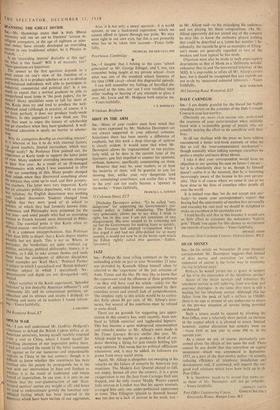JAZZ
SIR,—Perhaps the most telling comment on the very misleading article on jazz in your November 21 issue was provided by Kenneth Allsop himself when he referred to the 'expertness' of the jazz criticism of Amis, Tynan and the like. He may like to know that the cognoscenti read the effusions of these gentlemen --as they will have read his article—solely for the element of unintended humour occasioned by their countless errors and overall lack of comprehension. The simplest reply to this article would be to contra- dict flatly about 80 per cent. of Mr. Allsop's state- ments, but several of his assertions must be refuted in some detail.
There are no grounds for suggesting jazz appre- ciation in this country has, until, recently, been con- fined to leftish esoterics' and 'eggheaded hipsters.' This has become a quite widespread misconception and remarks similar to Mr. Allsop's were made in the Times Literary Review • earlier this year. Mr. Allsop would be unable to produce a shred of evi- dence showing a liking for jazz entails holding, left- wing opinions. This music has no political affiliations whatsoever and, it may be added, its followers are drawn from every social strata.
Again, Mr. Allsop is, altogether too sweeping in his remarks on the failure of concerts by American jazz musicians. The Modern Jazz Quartet played to full, not empty, houses all over the country; it is a gross exaggeration to say the Jazz from Carnegie Hall unit flopped,. and the only reason Muddy Waters caused little interest in London was that his agents unwisely arranged him only one under-publicised appearance in town. That Ellington ',played to thinnish houses' was not due to a lack of interest in his work, but—
as Mr. Allsop said—to his misjudging his audiences and not playing his finest compositions. (As Mr. Allsop apparently did not attend any of the concerts he may like to know the orchestra played nothing that could be described as a 'comic-hat number.') In- cidentally, the records he gave as examples of Elling- ton's music are generally regarded as two of the weakest and least typical he has made.
Objection must also be made to such imperceptive descriptions as that of Monk as a 'deliberate wcirdie' (whatever that is) and 'the introverted tinklings' of the MM. It is impossible to refute all Mr. Allsop's errors here. but it should be recognised that jazz records are not made by 'untutored coloured labourers.'--Youri
faithfully, MAX HARRISON 34 Clavering Road. W anstead, E12






































 Previous page
Previous page